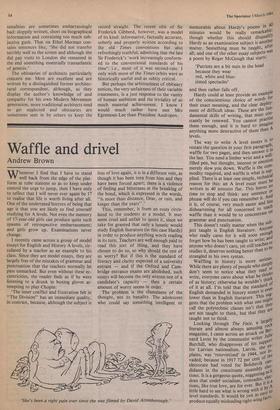Waffle and drivel
Andrew Brown
Whenever I find that I have to stand well back from the edge of the plat- form at tube stations so as to keep under control the urge to jump, then I have only to reflect that I will never ever again be 17 to realise that life is worth living after all. One of the underrated horrors of being that age is that you are likely to find yourself studying for A levels. Not even the memory of 17-year-old girls can produce quite such spasms of retrospective embarrassment; and girls grow up. Examinations never change.
I recently came across a group of model essays for English and History A levels, cir- culated by a teacher as an example to his class. Since they are model essays, they are largely free of the mistakes of grammar and punctuation that the teachers normally let pass unmarked. But even without these ec- centricities, the reader feels as if he were listening to a drunk in boxing gloves at- tempting to play Chopin: `The inner conflict and frustration felt in "The Division" has an immediate quality, in contrast, because, although the subject is loss of love again, it is in a different vein, as though it has been torn from him and they have been forced apart; there is a violence of feeling and bitterness at the breaking of the bond, which is expressed in the words, "is more than distance, Dear, or rain, and longer than the years".'
This, remember, is from an essay circu- lated to the students as a model. It may seem cruel and unfair to quote it, since we take for granted that only a lunatic would study English literature (in this case Hardy) in order to produce anything worth reading in its turn. Teachers are well enough paid to read this sort of thing, and they have chosen to do so, so why should the rest of us worry? But if this is the standard of literacy and clarity expected of a university entrant — and if the Oxford and Cam- bridge entrance exams are abolished, such essays will become the only written test of a candidate's capacity — then a certain amount of worry seems in order.
The problem is the clumsiness of the thought, not its banality. The adolescent who could say something intelligent or `She's been a right pain ever since she was filmed by David Attenborough.'
memorable about Hardy's poems in 40 minutes would be really remarkable. though whether this should disqualifY Hardy as an examination subject is another matter. Something must be taught, after all; and one of the other essay subjects Was a poem by Roger McGough that starts:
'Patriots are a bit nuts in the head because they wear red, white and blue- tinted spectacles' and then rather falls off.
Hardy could at least provide an example of the conscientious choice of words for their exact meaning, and the clear dePloY" ment of difficult ideas. These are the fun- damental skills of writing, that must con- stantly be renewed. You cannot practise them enough, and it is hard to imagine anything more destructive of them than A levels.
The way to write A level essays is t° restate the question in your first paragraPh, waffle for two pages, and then answer it in the last. You need a limber wrist and a well" filled pen, but thought, interest or emotion merely slow you down. Waffle is the coni- modity required, and waffle is what is sup' plied. There is at least one simple, technical reason for this: an A level essay must be written in 40 minutes flat. This leaves 11° time to stop and think: any sentence or phrase will do if you can remember it. Md it is, of course, very much easier and less disheartening for all concerned to teach waffle than it would be to concentrate on grammar and punctuation. This doesn't really matter when the sub- ject taught is English literature. AnYcale who really cares for it will soon enough forget how he has been taught to write; and anyone who doesn't care, yet still teaches °r studies it, deserves nothing better than to be strangled in his own syntax. Waffling in history is more serious' While there are plenty of people who siraPi Y.. don't seem to notice what they read ?! write, everyone cares about what he thinks of as history; otherwise he wouldn't ad"( of it at all. I'm told that the standard °' English demanded in history essays is even lower than in English literature. This su gests that the problem with what one !night call the polytechnic classes isn't that Oleic are not taught to think, but that they ar taught not to think. Looking through The Face, a largely literate and almost always amusing rock magazine, I came across an attack on Julie nard Levin by the communist writer Ju Burchill, who disapproves of his suPP"n lri , for Latvian nationalism. Latvia, she ex wlains, was `resovietised' in 1944, not the aded; because in 1917 72 per cent a the electorate had voted for Bolshevik eea-c: didates in the constituent assembly le tions. It is a gorgeous quote, suggesting it does that undet socialism, comrades, tions, like true love, are for ever. But it is little hard to see what is wrong with it by to level standards. It would be just as easYts. produce equally misleading right-wing fac










































 Previous page
Previous page